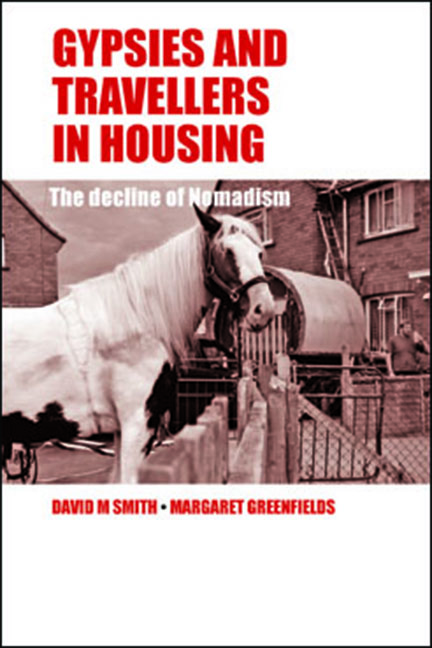Book contents
- Frontmatter
- Contents
- List of tables
- Acknowledgements
- Foreword
- one Introduction
- two Space, surveillance and modernity
- three Gypsies, nomads and urbanisation: a social history
- four The research sites and population sample
- five Routes into housing
- six Housing transitions
- seven Gypsies, Travellers and gorjers: conflict and cooperation
- eight Recreating community
- nine Young people in housing: aspirations, social relations and identity
- ten Conclusion
- Appendix A Methodologies
- Appendix B Glossary of words and terms
- References
- Index
three - Gypsies, nomads and urbanisation: a social history
Published online by Cambridge University Press: 03 February 2022
- Frontmatter
- Contents
- List of tables
- Acknowledgements
- Foreword
- one Introduction
- two Space, surveillance and modernity
- three Gypsies, nomads and urbanisation: a social history
- four The research sites and population sample
- five Routes into housing
- six Housing transitions
- seven Gypsies, Travellers and gorjers: conflict and cooperation
- eight Recreating community
- nine Young people in housing: aspirations, social relations and identity
- ten Conclusion
- Appendix A Methodologies
- Appendix B Glossary of words and terms
- References
- Index
Summary
Since the mid 19th century questions surrounding the urbanisation of Gypsies, the consequences of increasing contact with ‘gaje’/‘gorjer’ (non-Gypsy) society and the qualitatively different nature of such interactions in urban contexts, have been central to scholarly debates concerning the origins and destiny of this group. According to Mayall (2004), the most basic distinction in this debate is between two paradigms. The first provides racial, linguistic and ancestral explanations highlighting the Indian origins of the various diasporic Romani groups that are today scattered around the world (Hancock, 2002; Kenrick, 2004). This model was initially promoted in the journal of the Gypsy Lore Society (GLS), which was founded in 1888 by scholars and others interested in the culture and language of the Gypsies. At that point in its history, the GLS favoured a model based on scientific racism, which was strongly opposed to the ‘mixing’ of cultures and sought only to legitimise those Gypsies deemed to be of ‘pure-blooded’ ancestry (Hancock, 2007). Whilst the stigmatisation of ‘half-breed Gypsies’ and the insistence on the purity of bloodline is now widely discredited as a product of its time, the early work undertaken by members of the GLS into linguistic and socio-cultural patterns remains critical to the recognition of Gypsies as a people with Indic origins and an admixture of diverse European heritages as they made their way from the Balkans (where they were first recorded in around 1300 ce) towards the British Isles.
In contrast, the second model of Gypsy and Traveller origins offers a socio-historical explanation pointing to the many indigenous nomadic groups that emerged in Europe in the early modern period. This perspective highlights nomadism, economic and cultural practices and collective stigmatisation as the primary criterion for inclusion (Gmelch, 1986; Lucassen et al, 1998). Despite the overlap between these positions and an acknowledgement of intermixing between Romani and indigenous travelling groups, the political and legal ramifications of this dichotomy means that such nuances have often been ignored. Classification of different nomadic groups along racial lines and the construction of status hierarchies to classify those groups has long been of concern to state officials and other commentators. Historically, argues Mayall (2004, p 4), official efforts to label different nomadic groups for legislative and policy purposes symbolise the perennial failure of state responses to nomadism and provide ‘the clearest instances of how responses and category definitions are inextricably linked’.
- Type
- Chapter
- Information
- Gypsies and Travellers in HousingThe Decline of Nomadism, pp. 45 - 74Publisher: Bristol University PressPrint publication year: 2013



